Photo
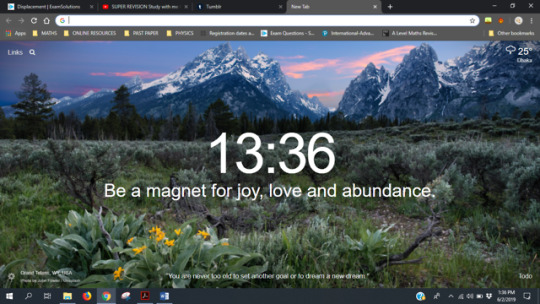
‘’Be a magnet for joy,love and abudance’‘ - I hope y’all a very productive day. <3 Love everything about this picture.
4 notes
·
View notes
Text
Revision Websites for IGCSE/GCSE!!!
||General:-
Revisionworld.com: This website provides free GCSE revision resources(& videos) for a range of subjects including Applied Science, Biology, Chemistry, English, French, Geography, German, History, ICT, Maths, PE, Physics and RS.
Passmyexams.co.uk :- Revision Notes For GCSE physics,chemistry and Biology.
Getrevising: This webstes have immense number of resources just from searching. For all subjects, do search them throught the fliter. From mindmaps to revision notes, this is your website to go to,
S-cool.co.uk: provies Revision guides, questions bank and resources.
BBC BITESIZE: Got learner guide and video clips (they are very small but really informative)
XTREME PAPERS: Revision notes for chemistry,biology,econ.
physicsandmathstutor.com: Revision notes, key points, worksheets and questions by topic from past papers
SAVEMYEXAMS.CO.UK:- HAVE TOPICWISE WORKSHEETS, WHICH ARE GREAT FOR REVISION.
|| Exam board(wise)
Edexcel:-
Pearson Edexcel: The official website of pearson, in this website, you will get your specification, exam timetable and past paper.
Edexcel Igcse wordpress: GUYS THIS WEBSITE IS WHAT YOU’VE BEEN LOOKING FOR. I LOVE THIS BLOG.
shawonnotes: one of the best revision website for edexcel, from past paper to revision notes (GOT IT ALL)
nerdcommunity: This website is best for edexcel, it contains everything you could possibly need for your IGCSE. They contain a vast number of resources, from past paper to ebooks, basically anything you could need right in few clicks. For past paper(latest):-
Paper-cut.weebly: They always have the latest past paper and markschemes whenver available
BilalAhmedBlog: They have pastpapers as well as Grade boundaries posted at times.
For Cambridge(CIE):-
RevisingIgcse: contains revision notes (almost) for all subjects of CIE IGCSE
GCE GUIDE: FOR CIE , THIS WEBSITE HAS IT, YOU JUST NAME IT, FROM EBOOK TO PAST PAPERS, THE GO-TO WEBSITE FOR CIE.
YUMPU.COM:- contains revision notes such as (x)(x), gotta search though.
IGCSEPRO: contains revision notes(and more) regarding sciences, eco, and ICT.
IGCSEREVISION: contains revision notes (yet again)
XTREMEPAPERS: You probably already know of these but xtremepapers is pretty good, especially if you are doing CIE IGCSE. It has revision notes and past papers.
Znotes.org: It has got a wide variety of IGCSE subjects and the notes can be downloaded in a pdf file through the website. Like IGCSE Pro - The Ultimate IGCSE Revision Website, ZNotes - Revise on... has got its notes updated to the latest 2016 syllabus. (However, these notes have been highly summarised and it is advised to go through more detailed notes)
Oxnotes: which boasts of notes for all three IGCSE Sciences.
CAMBRIDGE WEBSITE: last but not least, contains specification, past papers etc
Feel free to add more websites that helped you during gcses I will add them with the post! I hope you find it helpful, thank you so much for your support! :) I will make for gcses maths and science if you want ^-^, let me know!!!!
#resources#igcse#igcse physics#cambridge igcse#igcse biology#igcse ict#gcse studyblr#gcse student#gcses#gcse#gcse science#gcse phys#gcse chemistry#gcsechem#joolshallie#muststudy#onlineresources#edexceligcse#cie aqa cieigcse olevels#ocrgcse#gcse art#must study#gcses study tips study motivation gcse science cie edexcel igcse edexceligcse cieigcse websites gcsewebsites
2 notes
·
View notes
Text
thank you so much jasmine <3 I love your study channel and ofc your blog ^_^
Introduction:Studyblr.
Hello, guys, my name is Simran.
I made a studyblr about couple months ago, but wasn’t using but now since I am in sixth-form, I want to stay motivated and focused throughout the A-levels, and I want to share this journey with people who have enthusiasm for studying, being organized,helping each other, and being friendly all the same time. I wish to learn a lot from here. Here’s a few facts about me:- • I’m in 12th year, I’m studying physics, maths and accounting (finance). And I love maths, so you may see a lot of maths posts around! • I’m studying IAL (International Advance-Level), which is same as A-levels but it is taken as IAL in foreign countries outside U.K. • I am from bangladesh, but my ethnicity is Indian. • I can speak 4 languages fluently (Hindi, Bengali, Urdu, English) and I learnt german/arabic while I was growing up..so and a bit of German/arabic too. • I also am willing to keep a youtube channel to help you guys, with the online resources or revision notes you may need. •I love reading books, watching tv shows (kdrama, turkish shows) etc, if you have any suggestions/recommendations, inbox me, always up for it. if you have any questions, or need help, feel free to inbox or ask it away!
72 notes
·
View notes
Text
Introduction:Studyblr.
Hello, guys, my name is Simran.
I made a studyblr about couple months ago, but wasn’t using but now since I am in sixth-form, I want to stay motivated and focused throughout the A-levels, and I want to share this journey with people who have enthusiasm for studying, being organized,helping each other, and being friendly all the same time. I wish to learn a lot from here. Here’s a few facts about me:- • I’m in 12th year, I’m studying physics, maths and accounting (finance). And I love maths, so you may see a lot of maths posts around! • I’m studying IAL (International Advance-Level), which is same as A-levels but it is taken as IAL in foreign countries outside U.K. • I am from bangladesh, but my ethnicity is Indian. • I can speak 4 languages fluently (Hindi, Bengali, Urdu, English) and I learnt german/arabic while I was growing up..so and a bit of German/arabic too. • I also am willing to keep a youtube channel to help you guys, with the online resources or revision notes you may need. •I love reading books, watching tv shows (kdrama, turkish shows) etc, if you have any suggestions/recommendations, inbox me, always up for it. if you have any questions, or need help, feel free to inbox or ask it away!
#studyign#studyquill#charliewantstostudy#study motivation#bullet journals#studyspiration#studyblr#new study blog#nehrdist#joolshallie#pianoandstudy#muststudy#focusign#revisgn#studyspo#motivation#study#introduction#a levels#alevels#a level maths#a level physics#a level results#sixthform#sixth form#new studyblr#introvert#introductory post#welcome to studyblr#brbimstudying
72 notes
·
View notes
Text
college note taking 101: how i take notes and use them to study for exams
in lecture:
i like to take quick/shorthand notes because i think learning to discriminate between what is and isn’t important material is a good skill to have so i’m not drowning in useless information when it’s time to study for a midterm or final.
i like to bring my ipad and use the notability app. it’s easier for me to just carry an ipad mini and stylus than it is for me to lug around a heavy notebook/binder and several pens/pencils.
if the professor makes lecture slides available to students online (via a class website), i like to download them onto notability and annotate them as the professor goes along. that way, i can focus more on what the professor is saying and less on merely writing everything down.
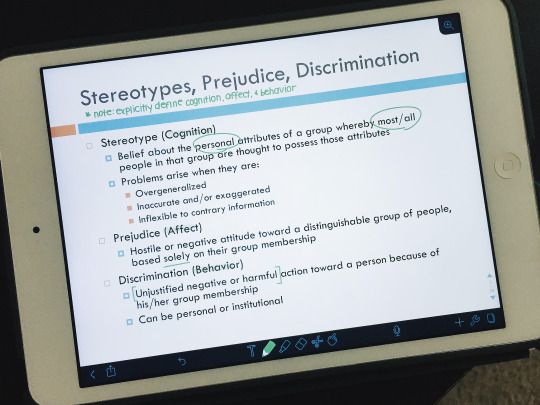
if lecture slides aren’t available, i type out my notes as i find it faster than handwriting them.
at home:
once i’m home, i take out my ipad and copy down my lecture notes into a specified notebook for that class, explain everything more thoroughly, make them neater, and organize them in a way that makes more sense to me (as opposed to copying them down exactly as how they were presented in lecture).
i like to use lots of colors, highlighters, and etc. and make them as pretty as possible so i actually want to use them to study from in the future.
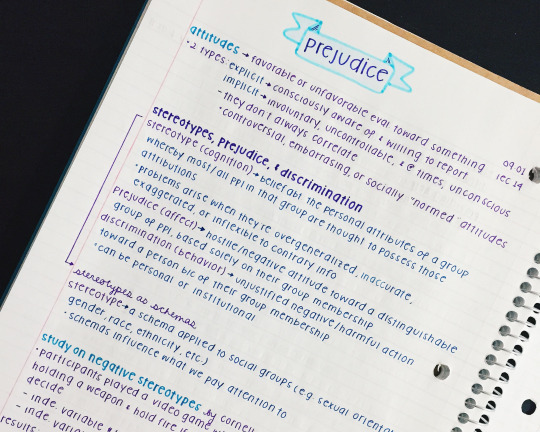
integrating reading notes:
normally, what professors will do is assign reading from a textbook and base their lectures around the reading (or have the reading be based on the lectures). usually exams/tests will rely mostly on what was said in lecture instead of in the reading and this is partly because they overlap so much. what the professor says in lecture, you should consider the “important points” in your reading. sometimes, though, there are things in the reading that seem important and weren’t mentioned in lecture.
what i’ll do if this is the case is take post-its, write the piece of information down, and stick the post-it in my notebook in the corresponding section (i.e. where it fits best with my notes)
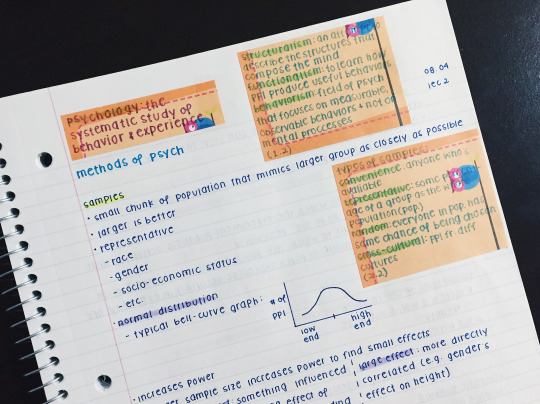
i like this method as opposed to taking notes directly in my textbook or having a separate notebook for only reading notes because 1) i’ve consistently found that reading material is not as heavily focused on in tests as lecture material and 2) i like to have all of my information in one place
using my notes to study:
when an exam is coming up, what i like to do is take all of the information in my notebook and condense it into a study guide that i can use to study from.
the format of my study guide varies depending on the class and which type of study guide and method of studying i think will help me best. my study guides range from flash cards to mind maps to sheets of paper with a bunch of condensed information.
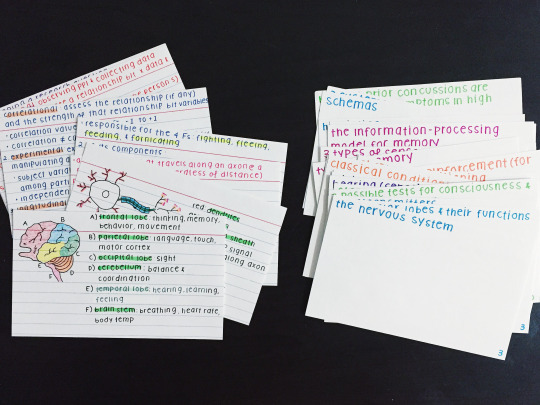
if i come across a concept on my study guide that i can’t completely explain to myself/don’t fully understand, that’s when i’ll look back in my notebook for a better and fuller explanation of it.
i also like to give myself some time before an exam to completely read through my notebook and look at all the notes i’ve taken (not just what i have on my study guide) because i think it’s a good refresher of all of the lecture and reading material and all of the information will be brought forward in my mind.
[* a few of you have asked me for a advice on note taking: how i take notes, methods i use, how i study from them, and etc. i hope this post was helpful to you! feel free to message me if you have any other questions. happy studying! ^_^]
35K notes
·
View notes
Photo

reblog and make a wish! this was removed from tumbrl due to “violating one or more of Tumblr’s Community Guidelines”, but since my wish came true the first time, I’m putting it back. :)
12M notes
·
View notes
Photo

One of my A-levels I am studying for is Maths. My college uses the exam board Edexcel and my modules I took this year are C1, C2 and S1. Next year I’ll be taking C3, C4 and S2. I will get my AS result on 17th August and will let you know what I got!
So, how do you achieve a good grade in maths? For me, the key is understanding why you’re doing something. If I don’t understand a topic, I’ll struggle thinking about how to solve the problem and I’ll have a mental block about it. However if I take five minutes to think about why I’m doing a series of steps to reach the answer and I understand what to do, it becomes second nature to me. So understand why you’re doing something and you’ll be able to do it!
The next step to excelling at maths is practising a lot. Do any homework that your teacher gives you, finish any exercises you don’t complete in class and do extra work from online or the textbook. For example, to save time in class we may only do the first column of questions from a textbook exercise, so when I get home I try to do the second column by myself for some extra practise. Use: MEI Integral, Physics & Maths tutor and Solomon Papers.
Now to some people this may seem like a waste of time, but personally I like to take notes for maths. These notes tell me what to do for different question types, give a few example questions and provide a resource that I can easily check if I’ve forgotten something. It also helps consolidate my knowledge at the end of a chapter and helps me to see if I do understand everything (see my first tip).
This one may seem obvious, but look at recent practise papers. Look at the previous few years and try to find questions that come up a lot! Then, practise them. Also, always mark your own papers (when possible) so you can see what examiners will look for from the mark scheme (what degree of accuracy to give your answer to, how to layout your answer, etc.). This gives a deeper understanding of a) what grade you’re working at and b) where you’re losing your marks.
Tying all of this together, sometimes when I’m doing practise papers, I’ll stop and think ‘why am I differentiating xxx’ to test myself on my knowledge and understanding of the topic. This gives a really thorough test of what you know!
Good luck for any upcoming maths exams you have and let me know what you think of these tips and if you think I missed out anything!
333 notes
·
View notes
Photo

reblog this 4.0 gpa for good luck on all of your finals
11K notes
·
View notes
Photo
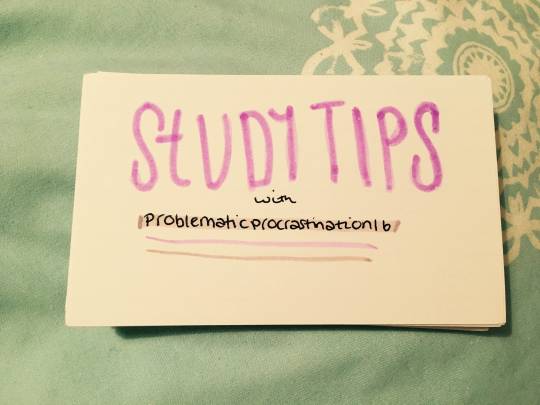
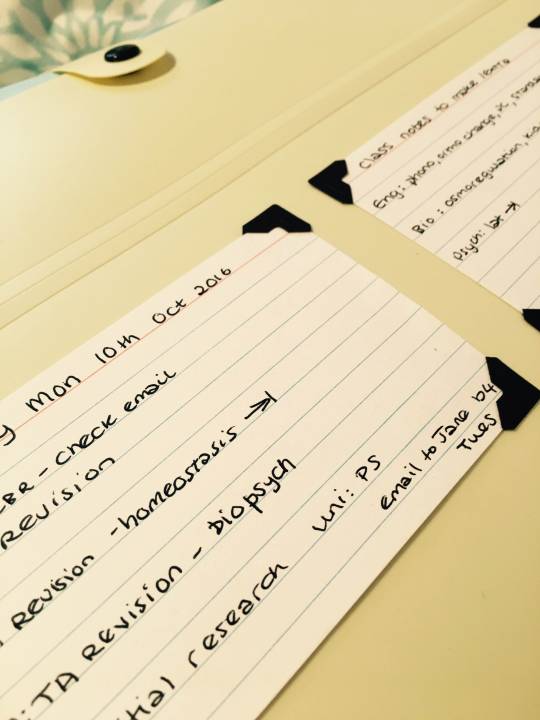
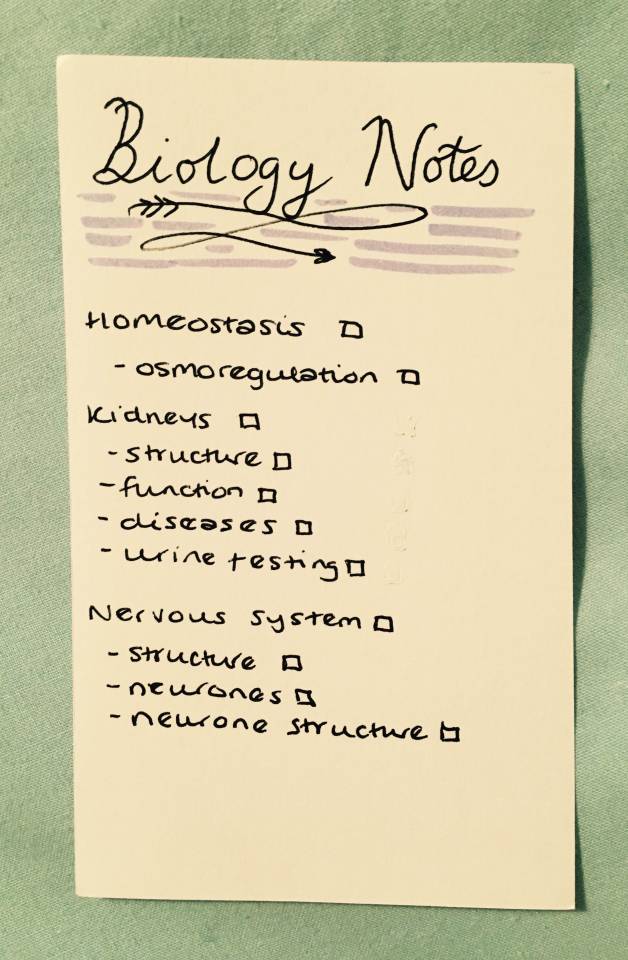
Study Tips:
1. Lists, lists and more lists. These are your best friends for being organised enough to even think about successful studying. To-do lists are what I use most and as shown I keep them with my work which will be referenced in the list as I’m usually going through the work to find out what needs to be done when I write my to-dos.
2. Be specific - I personally revise by making notes and then answering exam questions so I write down individual units that I need to make notes on and then break them up further. It leads to quicker progress and makes the whole process less sluggish and tedious. Also tick boxes. Record and reward progress.
3. Schedule study time - for me this means writing on my timetable to use specific free periods for study. I usually aim for two a day which leaves me with lunch (45 mins) and a free period of an hour free to socialise as this is important too. This way I’m studying for about 2 hours outside of lessons in college and consequently I have less to do at home.
4. Do work when it gets set or schedule a time to do it - do it now or set an alarm and actually do it later. This links to 3. You could set alarms at the weekends or on days off as well to prompt you to study. This provides a routine and this can help make studying a habit, just a thing you do rather than a chore.
5. Keep a routine when studying at home - again linked with 4. If you study at home, put routines in place. This will give you cues that will help get you into the mind set for study. Whether it’s wearing a specific piece of clothing or making a certain drink to have on your desk when you study, these will all help. It will also help with you recall of the information at a later date. (Bonus Psychology Fact: these are context dependent cues and the presence of the same one during learning and subsequent recall have been proven to improve recall).
6. Study with music - if you want to. Don’t be put off by studyblrs’ preferences on anything. For me the most prominent thing about that point is studying with music. Personally, music makes studying easier and more enjoyable. I cannot study in silence. I also don’t only listen to instrumental tracks because words distract you. I don’t believe that. In my personal opinion, music with lyrics won’t distract you anymore than using pretty coloured highlighters if you’re truly invested in what you’re doing.
7. Read ahead of the lesson plans - use textbooks or course booklets and read ahead into future lessons. This will help spur you on and renew your interest in the subject continually, of course, leading to increased MOTIVATION.
8. Read around the subject - like 7. this will help with maintaining your interest and keeping your motivation high. You’ll also be able to engage more with discussion as you’ll be able to offer different views.
9. Keep revision resources handy - I personally use cue cards for this reason. I can keep them on me pretty much all the time so if I have a spare five minutes or I get bored on the bus, I can whip out my cue cards and briefly go over notes. Even if it doesn’t go in it still feels productive.
10. Finally…DON’T LET A ‘BAD’ GRADE STOP YOU!! In my opinion, there’s no such thing as a bad grade. The best teachers will give you constructive feedback and the best students will ensure they take it on board. Honestly, from experience, the best advice I’ve ever received has been off the back of a bad assessment.
Let me know if you share any of these opinions with me or if you have any advice for me it would be greatly appreciated. I’m always looking for new ways to study to switch things up a bit.
~ C
114 notes
·
View notes
Text
Study tips: part 2
I’ve been working on a series of study tips, aimed at A level students but also somewhat suitable for GCSE and University. This is PART 2 - PHYSICS.
• Print off your specification, sort it into sections and put it at the front of your folder. This is invaluable for organising your work, checking off topics and realising that the teacher hasn’t covered something (yes, it does happen).
• When a new topic is introduced, make notes whilst the teacher is talking. You’ll often pick up things that other people didn’t, so you’ll have a better grasp of the topic before you’ve even started practicing!
• Faced with a problem, don’t expect to see the solution straight away. Think about which topic areas it relates to, which equations or processes you’ve covered in those topics and how they might relate to the question. Remember that the solution might have multiple steps, so if your technique doesn’t seem to be working, it might be the 2nd or 3rd step!
• Always ask questions! If you’re confused or just curious, ask! Bonus points if the teacher gets flustered or doesn’t know the answer.
• Help other people in your class to understand. Or even just teach your dog/younger brother. Think of as many different ways to explain the concept as you can.
• Make a list of key words and their definitions, especially the ones you’ll need to give in the exam.
• Ensure that you do at least one extended essay or report throughout the two A level years, to prepare you for university or a job in industry!
• Have confidence in your train of thought and logical arguments, but don’t cling to an idea if there’s evidence against it. Even in an exam, you’re allowed to scribble out everything you’ve done and start again. But if you write with confidence, you’re more likely to have included the key points rather than waffling.
• In experimental work, I can’t express how important it is to spend a few minutes thinking about the layout of your table and the scale of your graph. On so many occasions I’ve had to start again because I’ve messed it up, and a little careful thinking beforehand could have saved me a lot of time.
• To expand on the previous point: for a table, you need a column for every type of data you’re taking, including repeat readings, plus a column for every operation you do on the data afterwards. Try and have the two columns you’ll be plotting on your graph either next to each other or at either end - you don’t want to accidentally plot the wrong column! For a graph, round your lowest and highest readings to nice numbers, and see how many squares you’d need for scales of 1, 2, 5, 10 etc. Do this for both sets of data so you can decide on the orientation of your graph, then choose the most suitable scale.
If you find these useful, please give the post a like or reblog!
Part 1 sorry about the bad formatting!
100 notes
·
View notes
Photo
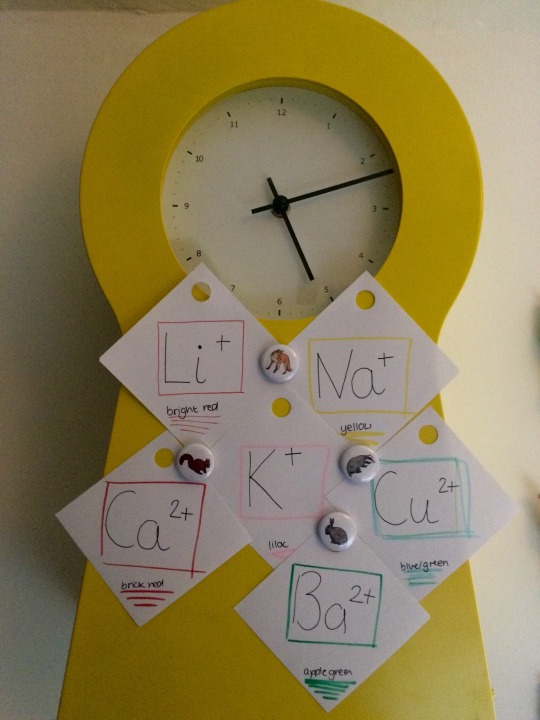
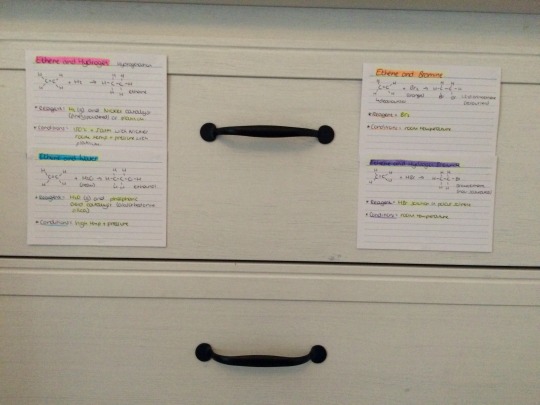
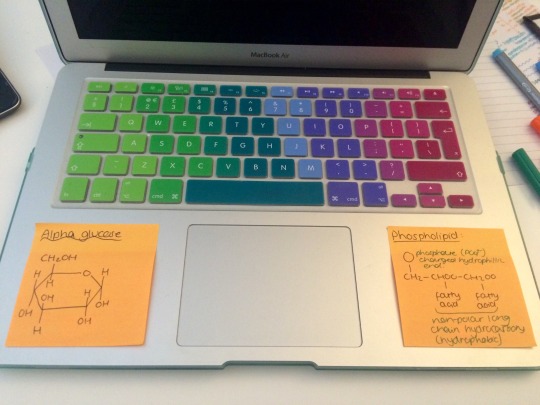
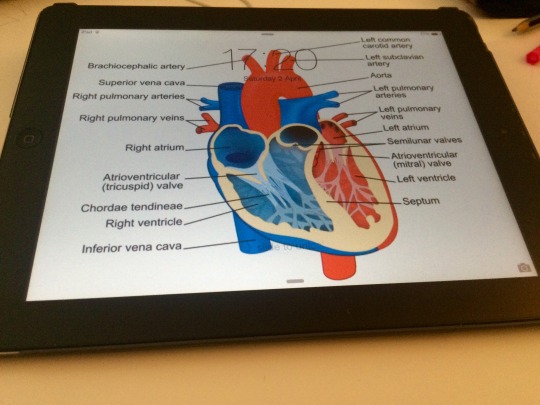
Memorising Key Facts:
With exam season creeping up, I thought I’d list a few tips/tricks on memorising key facts:
Locations: place little flashcards/post-its with the information you want to learn in different areas of your house/bedroom (like in the images above)- try to place them in areas that you look at a lot (clock, laptop). Maybe make a rule with yourself that whenever you use/look at the location, you have to read out the card a few times; for example whenever I open the drawer in the image above, I have to read out each flashcard- this way the facts will become almost routine and you’ll soon remember them with little prompting.
Colour: use colour to help memorise facts. For example, highlight each piece of information in a different colour, or write it on a different coloured post-it. This way you’ll stat to associate that fact with the colour and it’ll be easier to remember. This works especially well if you have synaesthesia like me!
Frequency: make sure you’re looking at the information frequently. This works well if you use the technique in the images as you’ll be frequently glancing at it and it’ll become familiar pretty quickly. It’s also good to put information as your laptop/tablet/phone background because you look at it a lot! You could also carry flashcards around with you and look at them when you have the chance (on the bus, in the queue at the shops, whilst eating, etc). You could also write a key word on your hand- this works especially well if you’re trying to remember how to spell it.
Tricks: use any little trick you can think of! For example, mnemonics- such as ‘My Very Easy Method Just Speeds Up Naming Planets’ for remembering the planets in the solar system, or ‘King Phillip Came Over From Great Spain’ for remembering the taxonomy order. You can also make your own up- usually rude ones are the ones that people remember the best! Maybe try making up a story or song that involves the things you’re trying to remember too.
Association: maybe try to associate a fact with something else. For example, maybe if you go to a certain place, try to learn a fact there and then when you think of the place you’ll think of the fact too. This works with food, actions, objects- basically anything!
People: try learning with people! You could ask a family member or friend to help you memorise a fact or phrase by saying it to you a lot, or by turning it into a sort of inside joke. For example, I like to get my mum to test me on chemistry because she has no clue what any of it means so says stuff wrong and has to get me to explain things- somehow this just helps me remember things even better.
Youtube: try finding a video about the thing you’re trying to remember. There are vast amounts of (often terrible) student-made and teacher-made educational videos on youtube. Find one about your thing and you’ll end up remembering it, usually because the video was so hilariously bad. Some of the best ones are music-based, for example: Transition metals song (payphone), Solubility rules (call me maybe), Photosynthesis song, All about that Base.
Please add to this with any techniques you have, and also feel free to message me if you need any help! :)
189 notes
·
View notes
Text
Different Revision Methods
Mindmaps
Lists
Writing out your notes
Apps such as memrise
Flashcards
Mnemonics
Songs
Repetition
Practice Papers
Drawings
Essays
Talking about the topic to a friend or family member
Feel free to add your own!
(Beautiful Learning)
414 notes
·
View notes
Text
If you have exams coming up soon then give this a read!
GCSEs? As/A levels? Uni entrance exams? End of year uni exams? Here are some tips:
- Struggling with motivation? Try taping a picture of the sixth form/college/uni/job you want where you work as a reminder of what it’s all about. If you don’t have any specific goals then try to imagine the pride you’ll feel when you achieve the grades you want.
- Struggling to organise revision? Prioritise what you need to work on first, but don’t dismiss the things you’re confident on. Don’t be afraid of getting things wrong - making mistakes at this stage will reduce the mistakes you make in the exam.
- Can’t focus? Try using interactive revision platforms like Sam Learning or BBC Bitesize.
Preparing for exams:
- DO NOT cram-revise the night before. Relax, have a bath or shower, watch a movie you like and get an early night.
- Remember that failing the exam DOES NOT mean the end of the world. Just do your best; no one can expect any more.
- EAT BREAKFAST. Even if it’s just a banana, you need the energy to perform at your best. Fruit and muesli are great.
After the exam:
- Don’t try and compare answers with your friends or you’ll drive yourself crazy. Just accept that what’s done is done and try and move on.
- Reward yourself! Exams are tough so before prepping for the next one, do something you enjoy, even if it’s just eating a chocolate bar.
Mental well being:
- Don’t be afraid to reach out for support. Exams are a very stressful time. Websites like Childine offer loads of tips and you can even talk to a counsellor online.
- If you already have mental health issues then don’t be afraid to ask for extra help. You’re not being silly or pathetic, and professionals will be expecting that you’ll need extra support. Don’t be ashamed of this.
Most importantly, whoever you are, remember that all exams can be retaken and that the grade you get does not define your intelligence or self worth.
Good luck!!
155 notes
·
View notes
Text
How to take perfect notes
Don’t worry about making your notes look beautiful in your class or lecture, instead focus on getting down all the relevant information. You can either type or write down these notes, use colours if you want but don’t make it too complicated.
When you get home, go through your notes with your text book and remake them, this means that you can get all the information you need in one place. Use as many colours and diagrams and symbols as you want!
Use colour - it helps to make different ideas and theories stand out. It also makes the notes look more aesthetically pleasing.
Try and write them by hand - for most people this will help you remember the information even better through kinetic memory, it also helps you decorate your notes better!
Don’t assume that you will remember certain bits of information in 6 months. I find that it helps if you write your notes as if you were going to give them to someone else who knows nothing about the topic.
If you have new information or new ideas, add them to your notes throughout the year. This will mean that when it comes to exam season you will have everything you need in one place and you will just have to learn the information.
(Beautiful Learning)
1K notes
·
View notes
Text
My Five Must-Have Apps for Studying
Since exam season is around the corner for lots of people, I thought I’d make a quick list of my favourite apps that I always need around when I study, and hopefully it helps someone!
(Note: these are all iOS apps so I’m not sure exactly which ones are available on Android - but if you like the sound of one then have a look for it on the Play store just in case!)
1. FocusNow - this is probably pretty well-known but it’s essentially a free version of the Forest app, where you set a time to study whilst a little plant grows, and if you quit the app to browse on your phone, you have to start over. I really like its flexibility and the fact that it keeps me so focused!
2. Checkmark - this app is really simple but so effective. It’s like a bullet journal on your phone, which is super useful if you’re like me and need to keep a list of things you need to do but aren’t dedicated enough to keep a journal everyday.
3. Gojimo. - this app contains little quizzes on topics which you are currently doing at school and can be used by students from lots of different countries. It’s great for journeys to school and back as you can refresh your memory and feel productive, knowing that you didn’t waste your commute time! Unlike other apps, it doesn’t need subscriptions or in-app purchases to use the quizzes.
4. 8tracks - again, this is really well-known but I adore it! There’s an amazing community on there who post a huge variety of playlists to listen to when studying, so you’re always engaged with new music but not distracted. I’d particularly recommend checking out @studyign‘s playlists; my favourites so far!
5. Plant Nanny - not strictly studying related but really useful nonetheless. You get to raise adorable little plants and record every time you have a glass of water - whenever you do, they do too! It’s a really cute take on water intake apps.
Other Helpful Tips: GCSE Maths Revision and Resources Revising for GCSE Science and English Revising for GCSE Science
925 notes
·
View notes
Photo
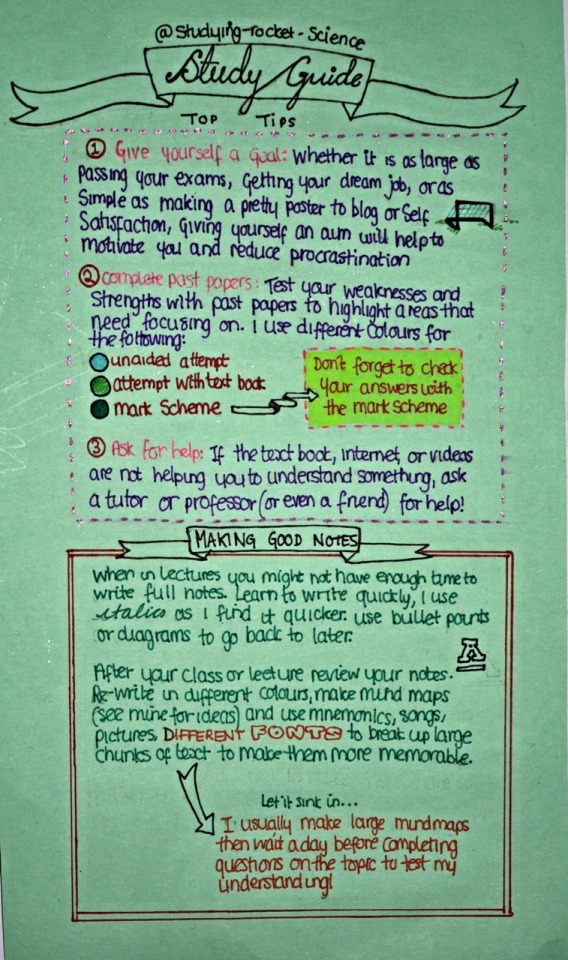
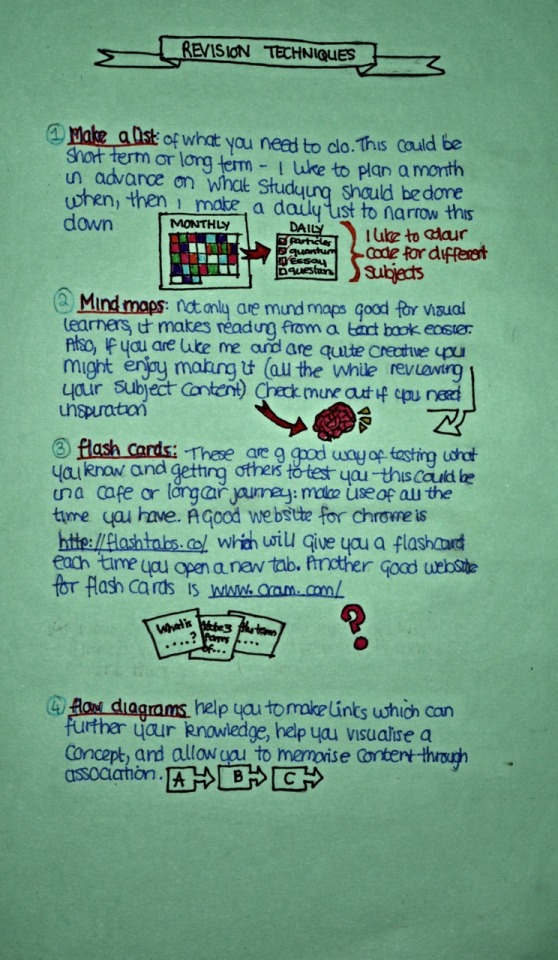
17:04 06.05.15
//Here are my top study tips for any exams, whether it’s mid-semester, or finals! There are so many different ways to revise and it’s all up to how you learn best. Good luck!//
657 notes
·
View notes
Text
Starting Your AS Levels
Hello! Here are some tips I have about going from GCSEs to AS level:
Keep your GCSE notes- please keep any relevant gcse notes because they can be useful for going over things that you’re doing in more depth at AS. You don’t have to keep them all (for example, if you’re doing art, history, english lit, and philosophy you won’t need your physics or french notes), just make sure you don’t throw away notes that you’ll regret not having later as you may want to look over them to recap basic ideas! Or maybe a friend or sibling in another year may find them useful- you never know so please don’t rush to burn them!
Go over things after every lesson- at the beginning of year 12 all my teachers said this to me and I just ignored them because like seriously no thanks, but when it came to spring I deeply regretted not going over things as suddenly I had to recap everything in just a few weeks! So I’d suggest that maybe one night every week, go over everything you’ve learned, rewrite notes if needed, and do extra practice questions on things you’re not sure of- it’ll definitely be worth it in the long run, trust me! Also it’s good to make revision notes throughout the year; for example, if you have a test on one topic of a subject, make some good quality notes and keep them as during exam season you’ll be so happy that you already have some good notes. The night before one of my AS chemistry exams I was trying to cram my way through the whole syllabus (revise early!! I’ll talk about this next) and cried tears of joy when I found a set of notes I’d made previously as it’s much easier to revise from concise notes than it is a textbook or your school notes.
REVISE EARLY!!!!!!- I’m currently in the middle of my AS exams and omg please please please start revising early! I kept saying ‘it’ll be fine, I’ll start next week’ from like January until mid-April and by then it was too late and I ended up not being able to revise everything I needed to and to a poorer enough level overall. Therefore please start revising definitely before March- this sounds a bit extreme as that leaves around 2.5 months before exams but ‘revise’ doesn’t just mean ‘write intense notes’: make mind maps, timelines for subjects like history, flashcards, do past papers, make notes based off mark schemes so you know what key words examiners like, etc. Make resources so that when it is April/May time you won’t be panicking (as much) as you already have concise notes to then make even more concise and specific notes off, and hopefully you’ll be much clearer on things from the start of the year that otherwise you’d have forgotten completely!
Do your homework- teachers set it for your benefit so by not doing it you’re just setting yourself back! Try to do it as soon as possible after you get it and please do actually try when doing it- don’t just google the answers straight away (I am very guilty of this and it only made things worse in exams as I hadn’t built up technique).
USE YOUR FREES- free periods are an absolute blessing and it’s easy to just see them as extra break times. However they are given to you for a reason and it’s soooooo important that you actually use them for what they’re for- working! It’s okay to be ‘free’ in your frees sometimes but more than not you should be working in them; catching up on homework, doing past exam questions, improving your notes, etc. Most sixth forms/colleges have quiet working areas/study centres so do try to take advantage of these areas in your frees- it means you have less work to do at home!
Plan- buy a planner/diary (if your school doesn’t provide you with one) and use it! Make sure you write down all your homework and when its due as it is extremely easy to lose track of things, especially if you have multiple teachers for one subject! I’d also recommend having a whiteboard or something in your bedroom where you can write a clear and visible to-do list.
Be organised- most sixth forms like you to use files and to write your notes on A4 lined paper, unlike in ‘books’ like you did in lower school. It’s extremely easy to end up with a messy file so please make sure that you organise it well (use dividers and maybe buy a mini hole punch and stapler to go in your bag- teachers are too good at not hole punching sheets…) as this will make revision a lot easier! It also makes a good impression on your teachers.
Crappy teachers- there isn’t much worse than having a crappy teacher at A level. It’s seriously frustrating- especially if there’s another class for the subject you’re doing who have the good teacher! If you’re unfortunate enough to get a bad teacher, please don’t let it define your grades! Download your exam’s spec from their website, buy a textbook/revision guide, etc, Basically do as much as you can to make sure you’re learning everything that you should be and that you don’t fall behind. Maybe talk to another teacher if you really need help or straight up tell your teacher that you aren’t learning from them- most are happy to help and don’t realise that they’re so bad! Tell them how you learn best and maybe they can adapt to help you.
Buy revision guides/wider reading- please try to get a hold of revision guides as they will save your life during exam season. If money is tight, speak to a teacher as most schools have bursary funds that can help you out if needed. It can also be good to do some wider reading, especially around subjects you may want to continue in the future- ask teachers or google for recommendations.
Use online resources- if your school has access to revision websites, etc. please try to use them! Really take advantage of as many resources as you can since A-level resources are more scarce than GCSE ones.
Make decent notes- this one is very important! Please make sure that your notes throughout the year are good quality- if you feel like they aren’t then make sure you add to them using a textbook/revision guide as otherwise you might end up revising from sub-par notes and therefore won’t get the top grades.
Catch up- if you miss a lesson (even if a friend tells you that you didn’t miss anything important) always go and see your teacher as soon as possible! You must make sure you don’t miss a single thing and also it’ll make your teacher like you more since you’re actively trying to catch up!
Give yourself a break- please make sure you have a life outside of school work! But also make sure you don’t get too wild; usually the people who flake out are the ones who party too hard or work too hard. So make sure you find a good balance. Sixth form/college is an awesome chance to make/maintain some amazing friendships so make the most of it! Also please don’t feel pressured to get a girl/boyfriend and if you do, do not let your relationship get in the way of your grades.
Good habits- also try to make sure you stay healthy and make good diet/exercise habits. It’s vital that you have an outlet (running, tennis, walking you dog, whatever you like) outside of school. Also, exercise is good for your brain! A levels can be extremely stressful so you need to try to take care of yourself or else you might not make it- I know many people who dropped out because they couldn’t deal with the stress so you need to try to deal with this as best you can. If you do start to struggle, talk to a teacher as this is very common and there’s lots they can do to help you!
It’s okay to fail- there is no way (unless you’re superhuman) that you can continue getting the same grades at GCSE and at AS; for example I got A’s and A*s in chemistry all through GCSE (an A at the end) and in AS I always got B’s (and a few D’s…). AS is such a huge step up in most subjects (some you may find are quite similar- I found this for geography but most are way more complex) so it’s totally fine to not get the top grades; at AS you can’t even get A*s (they don’t exist) and E’s are still a pass so it’s really not expected of you to get the same grades as gcse, especially at the beginning. It can be disappointing but please try not to get down about this! At the start of the year I was getting mostly D’s-B’s and towards the end it was more B’s and a few A’s so there’s plenty of time to improve. Also, if you feel that at the beginning of the year you want to swap subjects, do talk to your teachers as this may be possible within the first few weeks. Remember that you could retake year 12 if thins went terribly wrong so it’s not the end of the world if you fail everything! Also the new AS levels don’t count towards your final A level grade so you do get a second chance.
Overall: so overall the jump can be pretty daunting but to be honest it’s really not that bad as long as you stay organised and ask for help if you need it. In sixth form, learning is more your own responsibility so you need to make sure that you are doing enough work outside of school and that you understand all topics being covered. Year 12 and 13 are seriously some of the best years of school (the best yet to be honest) so do also try to make the most of them!
I hope this is helpful and please do feel free to send me any questions you might have! :)
359 notes
·
View notes